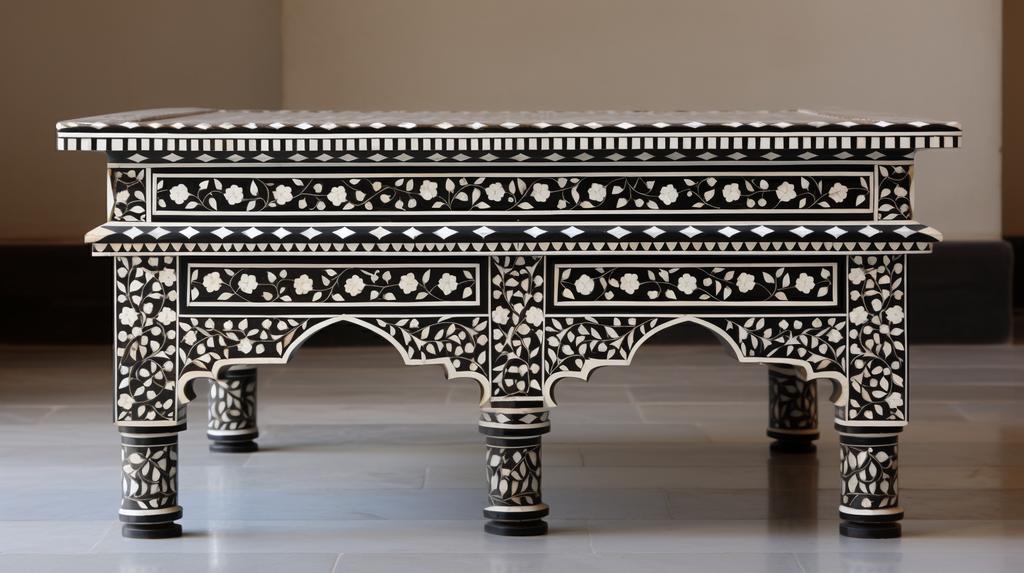Bone inlay craft is a timeless art form that combines intricate craftsmanship with a rich cultural heritage. This unique form of artistry has captured the admiration of art enthusiasts and interior designers across the globe. From regal palaces to contemporary homes, bone inlay furniture adds a touch of elegance and sophistication that transcends trends. But what makes this craft so special? To understand its allure, it is essential to explore its history, tradition, and enduring significance.
Origins of Bone Inlay Craft: A Glimpse into the Past
Bone inlay craftsmanship traces its origins to the royal courts of Rajasthan, India, during the 16th century. This art form was initially commissioned by royalty to adorn their palaces with opulent and intricate furniture. Skilled artisans meticulously carved and arranged pieces of bone, ivory, or mother-of-pearl into wood to create breathtaking patterns. These decorative items became symbols of luxury, showcasing the wealth and status of their owners.
Over time, the craft evolved to incorporate various materials and designs while maintaining its fundamental techniques. Today, the bone inlay craft remains an iconic representation of India’s artistic heritage, blending ancient traditions with contemporary aesthetics.
The Process Behind Bone Inlay Craftsmanship
Creating a bone inlay masterpiece is an intricate process that requires precision, patience, and unparalleled craftsmanship. The journey begins with skilled artisans hand-cutting pieces of ethically sourced camel bone or other materials into the desired shapes. These pieces are then meticulously arranged into patterns, often inspired by floral motifs, geometric shapes, or traditional Mughal designs.
Once the design is set, a resin base is applied to secure the inlay pieces. The artisan smoothens the surface to ensure a seamless finish before applying final touches like sanding and polishing. Each step reflects the dedication and expertise of the craftsmen, resulting in furniture pieces that are as durable as they are beautiful. Whether it’s a Bone inlay dining table or a decorative console, the process transforms raw materials into stunning works of art.
Cultural Significance of Bone Inlay Art
Bone inlay is more than just an art form; it is a testament to the rich cultural and artistic heritage of India. For centuries, this craft has been passed down through generations of artisans, preserving its authenticity and charm. Each piece tells a story, not just of artistic skill but also of cultural pride.
In Rajasthan, where this craft originated, bone inlay continues to thrive as a livelihood for local artisans. By purchasing bone inlay furniture, buyers are not only acquiring a unique piece of history but also supporting the preservation of a centuries-old tradition.
Modern Adaptations of Bone Inlay Craft
As interior design trends have shifted, bone inlay furniture has found its way into modern homes and commercial spaces. Designers and homeowners alike appreciate the versatility of this art form, as it can seamlessly blend into traditional, eclectic, or contemporary settings. Items like bone inlay consoles, mirrors, and side tables add an exotic touch to any room, while larger pieces like a Bone inlay exporter in India reflect the global reach of this timeless craft.
Modern artisans have adapted the traditional craft to suit contemporary tastes, introducing new colors, patterns, and functionalities. From bold monochromatic designs to subtle pastel hues, these innovations demonstrate how bone inlay art continues to evolve without losing its essence.
Why Bone Inlay Furniture Remains Timeless
The enduring appeal of bone inlay furniture lies in its ability to combine beauty, functionality, and cultural significance. Unlike mass-produced furniture, each bone inlay piece is unique, showcasing the artisan’s skill and attention to detail. The intricate patterns and luxurious finishes make it a centerpiece in any interior setting, whether used as a functional item or a decorative accent.
Furthermore, the durability and timeless appeal of bone inlay furniture make it a worthwhile investment. Its ability to withstand wear and tear while retaining its elegance ensures that it remains a cherished possession for years to come.
Sustainable Practices in Bone Inlay Craft
As the demand for bone inlay furniture grows, ethical and sustainable practices have become a priority. Modern artisans prioritize using ethically sourced materials, such as discarded camel bones, ensuring that no animals are harmed for the purpose of the craft. These practices align with the growing awareness of environmental responsibility, making bone inlay furniture a conscious choice for environmentally minded consumers.
In addition to sustainability, supporting bone inlay artisans contributes to the preservation of traditional crafts and provides economic opportunities for local communities. By choosing bone inlay furniture, buyers are investing in not just a product but also a sustainable future for artisans and their craft.
Conclusion: A Celebration of Art and Tradition
Bone inlay craft is a celebration of tradition, artistry, and cultural heritage. Its journey from the royal courts of Rajasthan to modern homes around the world reflects its universal appeal and timeless beauty. Whether you’re drawn to the intricate designs or the cultural significance of the craft, bone inlay furniture offers a connection to history that is both tangible and enduring.
Evershine Export, a leading name in this domain, continues to bring this extraordinary art form to the global stage. Through their dedication to quality, craftsmanship, and ethical practices, they honor the legacy of bone inlay craft while making it accessible to a wider audience. Explore their exquisite collection to bring a piece of this rich tradition into your home.

